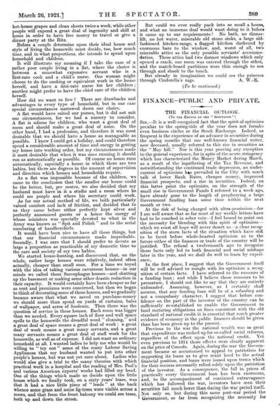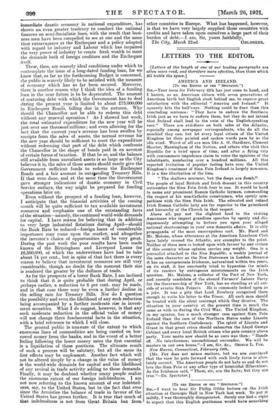FINANCE—PUBLIC AND PRIVATE.
1.H.N, FINANCIAL OUTLOOK.
[To THE EDITOR OF THE SPECTATOR.") SIR, —It is a well-recognized fact that the spirit of optimism peculiar to the spring-tide of the year does not forsake even business circles or the Stock Exchange. Indeed, so frequent is the experience of an advance in securities during the spring months that one well-known financial writer, now deceased, usually referred to this rise in securities as the "May hill." Nor is this year proving any exception to the general experience, for in spite of the acute stringency which has characterized the Money Market during March, as a result of the ingathering of the Tax Revenue, and notwithstanding the continued trade depression, an under- current of optimism has prevailed in the City with much talk of lower Bank Rates, cheaper money, improved financial prospects, and a rise in securities. Indeed, on this latter point the optimists, on the strength of the small rise in Government Funds I referred to a week ago, have already gone to the length of prophesying a large Government funding loan some time within the next month or two.
At the risk of being charged with ultra-pessimism—for I am well aware that so far most of my weekly letters have had to be couched in sober vein—I feel bound to point out the necessity for blending with this spirit of optimism— which we must all hope will never desert us—a clear recog- nition of the stern facts of the situation which have stilt to be faced before whole-hearted optimism as to the future either of the finances or trade of the country will be justified. The refusal a twelvemonth ago to recognize those facts only led to both financial and social mishaps later in the year, and we shall do well to learn by experi- ence..
In the first place, I suggest that the Government itself will be well advised to mingle with its optimism a recog- nition of certain facts. I have referred to the rumours of a funding loan ; and while I believe those rumours to be premature, I should not like to say that they are entirely unfounded. Assuming, however, as I certainly shall assume, that any funding loan will be of a voluntary and not a compulsory character, I suggest that before con- fidence on the part of the investor of the country can be sufficiently re-established to enable the Government to fund maturing obligations on lines consistent with the old standard of national credit it is essential that much greater evidence of economy in the public finances should be given than has been given up to the present. Previous to the war the national wealth was so great that expenditure was rushed up for so-called social reforms, regardless of the effect upon the national credit. Yet even previous to 1914 those effects were clearly apparent on the price of Consols. Again, during the war the Govern- ment became so accustomed to appeal to patriotism for supporting its loans as to give scant heed to the actual financial position, and loans were issued upon terms which for their success necessarily relied solely upon the patriotism of the investor. As a consequence, the fall in prices of practically every Government loan has been enormous, and, to the accompaniment of continued extravagance which has followed the war, investors have seen their securities fall much lower than during the war period itself. Not only so, but during this same post-war period the Government, so far from recognizing the necessity for immediate drastic economy in national expenditure, has shown an even greater tendency to conduct the national finances on semi-Socialistic lines, with the result that busi- ness men have been compelled to see at one and the same time extravagance at the Exchequer and a policy adopted with regard to industry and Labour which has impaired the very power of industry to create fresh wealth to meet the demands both of foreign creditors and the Exchequer itself.
These, then, are scarcely ideal conditions under which to contemplate the issue of a long-dated funding loan, for we .know that, so far as the forthcoming Budget is concerned, the public is scarcely likely to be satisfied with the measure of economy which has so far been secured. Moreover, there is another reason why I think the idea of a funding loan in the near future is to be deprecated. The amount of -maturing debt with which the Government has to deal during the present year is limited to about £73,000,000 in Exchequer Bonds, falling due in the autumn. Why should the Chancellor not be able to redeem this debt without any renewal operation I As I showed last week, the total estimated expenditure for the new year will be just over one thousand millions ; and even allowing for the fact that the current year's revenue has been swollen by receipts from the sales of assets, the normal revenue for the new year should be sufficient to meet the expenditure without redeeming that part of the debt which confronts the Chancellor in the shape of bonds paid in on account of certain forms of taxation. If that be so, and the balance still available from unrealized assets is as large as the City believes it is, the sales of those assets should surely give the Government sufficient funds to redeem the Exchequer Bonds and a fair amount in outsbanding Treasury Bills. If that were done, and at the same time the Government gave stronger indications of drastic economy in Civil Service outlays, the way might be prepared for funding operations later on. Even without the prospect of a funding loan, however, I anticipate that the financial activities of the coming month will be quite sufficient to tax available investment resources and emphasize one of the outstanding facts of the situation—namely, the continued world-wide demands for capital. I have reason for believing that in addition to very large industrial flotations during April—should the Bank Rate be reduced—foreign loans of considerable importance may come upon the market, and altogether the investor's choice of opportunities will be very great. During the past week the poor results have been made known of the Birmingham and Liverpool Loans for £6,600,000, of which the underwriters have had to take about 74 per cent., but in spite of that fact there is every reason to believe that investment resources are still very considerable, though no doubt for the moment their size is rendered the greater by the dullness of trade.
As for the prospects of a lower Bank Rate, I am inclined to think that it is quite probable that during April, or perhaps earlier, a reduction to 6 per cent. may be made, and in that case there may be even a further decline in the selling rate for Treasury Bills. Nor do I question the possibility and even the likelihood of any such reduction being accompanied by a further moderate rise in invest- ment securities. What I do suggest, however, is that any such moderate reduction in the official value of money will not change three fundamental facts in the situation, with a brief reference to which I will close.
The general public is unaware of the extent to which enormous lines of commodities are being carried on bor- rowed money from the banks, and in the event of a better feeling hollowing the lower money rates the first essential is a liquidation of these positions. The ultimate result of such a process will be salutary, but all the same its first effects may be unpleasant. Another fact which will not be altered simply by a change in the value of money is the world-wide demands for capital and the likelihood of any revival in trade activity adding to those demands. Finally, it may be doubted whether many people realize the enormous extent of our foreign indebtedness. I am not now referring to the known amount, of our indebted- ness, say, to the United States, but to the fact that ever since the Armistice the balance of trade in favour of the United States has grown further. It is true that much of•that indebtedness is not from Great Britain but from other countries in Europe. What has happened, however, is that we have very largely supplied those countries with credits and have taken upon ourselves a, large part of their burden of debt.—I am, Sir, yours faithfully, The City, March 22nd. Om comma.



































 Previous page
Previous page